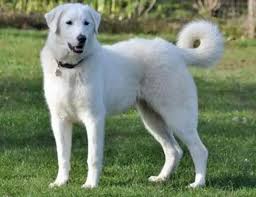
Akbash
Conditions of detention
Akbash dogs thrive in rural or farm settings where they have space to roam and perform their guarding duties. They are not well-suited for apartment living due to their size and exercise needs.
Useful Fact: Ensure your Akbash has a secure, fenced area to prevent them from wandering off, as their guarding instincts can lead them to patrol large areas.
Nutrition and diet
A balanced diet with high-quality protein is essential for the Akbash. They do well on a diet formulated for large breeds with moderate activity levels.
Useful Fact: Avoid overfeeding to prevent obesity and related health issues. Feeding them twice a day is recommended.
Health
Akbash dogs are generally healthy but can be prone to hip dysplasia and other joint issues due to their size. Regular vet check-ups are crucial for maintaining their health.
Useful Fact: Providing joint supplements and maintaining a healthy weight can help prevent joint problems.
Grooming and care
The Akbash has a double coat that sheds seasonally. Regular brushing, especially during shedding seasons, helps keep their coat healthy and reduces loose fur.
Useful Fact: Bathing is rarely needed, as their coat naturally repels dirt. Occasional baths are sufficient unless they get particularly dirty.
Education and training
Akbash dogs are intelligent and independent, making them somewhat challenging to train. Positive reinforcement and early socialization are key to successful training.
Useful Fact: Start training and socialization early to ensure they grow into well-mannered adults. Consistency and patience are essential.
Toys and entertainment
Akbash dogs are not typically interested in toys but may enjoy interactive games that stimulate their mind and exercise their body.
Useful Fact: Activities that mimic their natural guarding behavior, such as hide-and-seek or agility exercises, can be engaging for them.
Safety
Ensure your property is securely fenced, as Akbash dogs have strong protective instincts and may wander in search of perceived threats.
Useful Fact: Microchipping your Akbash can help locate them if they ever get lost.
Accessories
Essential accessories include a sturdy leash, collar, and identification tag for outings. A comfortable bed is also important for their rest.
Useful Fact: Invest in a durable, heavy-duty leash and collar to handle their strength.
Socialization
Early and ongoing socialization with different people, animals, and environments is crucial for Akbash dogs to prevent overprotectiveness.
Useful Fact: Regular socialization can help mitigate their natural wariness of strangers and other animals.
Travel and Transportation
Akbash dogs can travel well if accustomed to it from a young age. Use a secure crate or harness for car travel to ensure their safety.
Useful Fact: Short, positive travel experiences can help them become more comfortable with longer journeys.
Behavior and psychology
Akbash dogs are known for their independence, loyalty, and strong protective instincts. They require mental and physical stimulation to stay happy.
Useful Fact: Providing them with a job or purpose, such as guarding livestock, can satisfy their natural instincts and prevent boredom.
Legal aspects
Familiarize yourself with local pet laws, including licensing, leash requirements, and breed-specific legislation, to ensure compliance and avoid fines.
Useful Fact: Many regions require dogs to be licensed and vaccinated; keep their records up to date.


